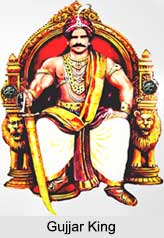 History of Gujjar Community is quite uncertain and vague. There are several references that talk about the origin and history of Gujjars. Like for instance, in Ramayana, a war was fought between the gods and the evil spirits. The Gujjars fought against the devils under King Dasharatha. In Mahabharata also, references suggested the references of Gurjars. They were found along with Lord Krishna who migrated from Mathura to Dwarka, Gujarat. In the past, Gujjars have also been hypothesized to be descended from the nomadic Khazar tribes.
History of Gujjar Community is quite uncertain and vague. There are several references that talk about the origin and history of Gujjars. Like for instance, in Ramayana, a war was fought between the gods and the evil spirits. The Gujjars fought against the devils under King Dasharatha. In Mahabharata also, references suggested the references of Gurjars. They were found along with Lord Krishna who migrated from Mathura to Dwarka, Gujarat. In the past, Gujjars have also been hypothesized to be descended from the nomadic Khazar tribes.
Origin of Gujjar Community
The Gurjar clan appeared in northern India around the time of the Huna invasions of northern India. Some scholars believed that the Gurjars were foreign immigrants, possibly a branch of Hephthalites (`White Huns`). Some scholars believed that Gujjars came into India with the Hunas, and the name of the tribe was transformed to "Gurjara" in Sanskrit. They also believed that several places in Central Asia, such as "Gurjistan", are named after the Gujjars and that the reminiscences of Gujjar migration are preserved in these names.
At the end of 5th century Hunas, a marauding tribe entered Afghanistan, Pakistan and India. Hunas were cruel people much displaced from their ancient homelands on the borders of Europe and Asia. They were, like Aryans who preceded them, white folks. Along with this rude, crude and cruel tribesmen came lesser tribes, Gurjars being one of them. They established their fiefdoms, principalities in Punjab, Rajasthan, including but not limited to Jodhpur, Gujarat, Gujranwalla, a small town in Punjab, Gurjarkhan, also in Punjab.
Etymology of Gujjar Community
Well known scholar Cunningham thinks that Gujjars are descended from Scythian (Saka) and Yuechi (Kushan) tribes who invaded Pakistan in the 1st century BC and in the 1st century AD respectively. Other scholars believe that they are descended from a Central Asian Turkic people called Kazars. Since the tribe migrated from Caspian Sea which is called Bahr-e-Khizar it was named Khizar, Guzar, Gurjar, Gurjara or Gujjar. The name Hazara was given to the district by these Guzara tribes. The name Gujjar, according to another version, is derived from the words `Gau` and `Char` meaning cattle grazers.
Some more records stating the history of Gujjars specifies that Gwalior state had a district belonging to Gujjar tribal group by the name Gurjargarh. They were, mainly distributed west of Aravalli mountain ranges.









